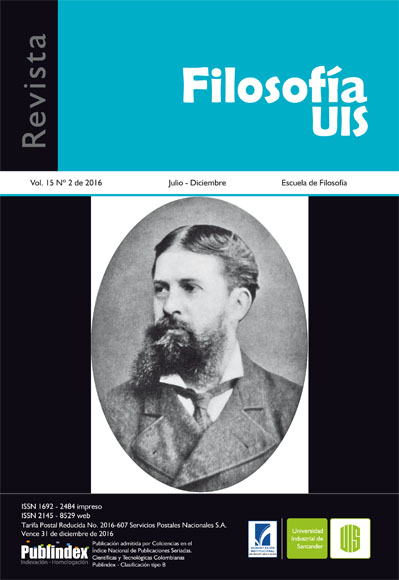Research Article
Knowledge, justification and aporia the problem in Plato’s Theaetetus and its presence in contemporary epistemology
Published 2016-11-30
Keywords
- knowledge,
- justification,
- Theaetetus,
- Gettier,
- aporia
How to Cite
Sarmiento Espinosa, R. M. (2016). Knowledge, justification and aporia the problem in Plato’s Theaetetus and its presence in contemporary epistemology. Revista Filosofía UIS, 15(2), 261–279. https://doi.org/10.18273/revfil.v15n2-2016013
Copyright (c) 2016 Revista Filosofía UIS

This work is licensed under a Creative Commons Attribution 4.0 International License.
Abstract
This paper aims at bringing together the aporetic approach to knowledge in Plato’s Theaetetus, with the program of analysis of knowledge in contemporary epistemology. Through this link, it shows the persistence, on the one hand, of Plato’s problem in contemporary epistemology, and, on the other, of his aporia. As a result, the paper sheds light from an historical perspective, on the essential features of the epistemological debate in general.Downloads
Download data is not yet available.
References
- Anscombe, E. (1965). “Necessity and truth”. Collected papers, (1), 81-86.
- Chisholm, R. (1977). Theory of Knowledge. New Yersey: Englewood Clifs.
- Chisholm, R. (2000). “The myth of the given”. Epistemology, an anthology. Sosa, E. et al. (Eds.). New Yersey: Blackwell.
- Cornford, F. M. (2007). La teoría platónica del conocimiento. Traducción y comentario del Teeteto y Sofista. Barcelona: Paidós.
- Craig, E. (1990). Knowledge and the state of nature: An essay in conceptual synthesis. Oxford: Clarendon Press.
- Dancy, J. (1993). Introducción a la Epistemología Contemporánea. Tecnos: Madrid.
- Deleuze, G. (1996). Empirismo y subjetividad.Barcelona: Gedisa.
- Enskat, R. (2015). “Das doxastische Dogma”. Applied philosophy. An international Journal, 1, 115-123.
- Fine, G. J. (1979). “Knowledge and logos in the Theaetetus”. The philosophical Review, 88(13), 366- 397.
- Gettier, E. (1963). “Is justified true belief knowledge”. Analysis, (23), 121-123.Goldman, A. (1976). “Discrimination and perceptual knowledge”. Journal of philosophy, (73), 771-799.
- Goldman, A. (2000). Sosa, E. et al. (eds.). “What is justified belief?” Epistemology, an anthology. Oxford: Blackwell.
- Lehrer, K. y Paxton, T. (1969). “Knowledge: undefeated justified true belief”. Journal of Philosophy, (66), 225-237.
- Pollock, J. (1986). Contemporary theories of knowledge. Washington: Rowman & Littlefield.
- Platón, (1993). Teetetos. Traducción del griego, análisis y comentario con introducción y notas bibliográficas de Castor Narvarte. Santiago: Universidad de Chile, Ediciones del Departamento de Estudios Humanísticos.
- Sellars, W. (1963). Science, Perception and Reality. London: Routledge & Kegan Paul.
- Sosa, E. (1992a). “Los fundamentos del fundacionismo”. Conocimiento y Virtud intelectual. México: Fondo de cultura económica.
- Sosa, E. (1992b). “La Balsa y la pirámide”. Conocimiento y Virtud intelectual. México: Fondo de cultura económica.
- Zagzebski, L. (1994). “The inescapability of Gettier problems”. The Philosophical Quarterly, 44 (174), 65-73.
